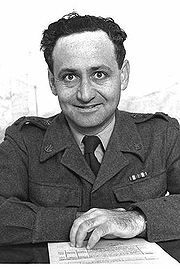
Yehoshafat Harkabi
Encyclopedia

Israel
The State of Israel is a parliamentary republic located in the Middle East, along the eastern shore of the Mediterranean Sea...
military intelligence
Aman (IDF)
The Directorate of Military Intelligence is Israel's central, overarching military intelligence, of the Israel Defense Forces. Aman was created in 1950, when the Intelligence Department was spun off from the IDF's General Staff ; the Intelligence Department itself was composed largely of former...
from 1955 until 1959.
Biography
Harkabi had a good command of Arabic, a deep knowledge of ArabArab
Arab people, also known as Arabs , are a panethnicity primarily living in the Arab world, which is located in Western Asia and North Africa. They are identified as such on one or more of genealogical, linguistic, or cultural grounds, with tribal affiliations, and intra-tribal relationships playing...
civilization and history, and a solid understanding of Islam
Islam
Islam . The most common are and . : Arabic pronunciation varies regionally. The first vowel ranges from ~~. The second vowel ranges from ~~~...
. He developed from an uncompromising hardliner to supporter of a Palestinian
Palestinian territories
The Palestinian territories comprise the West Bank and the Gaza Strip. Since the Palestinian Declaration of Independence in 1988, the region is today recognized by three-quarters of the world's countries as the State of Palestine or simply Palestine, although this status is not recognized by the...
state
Sovereign state
A sovereign state, or simply, state, is a state with a defined territory on which it exercises internal and external sovereignty, a permanent population, a government, and the capacity to enter into relations with other sovereign states. It is also normally understood to be a state which is neither...
who recognized the PLO as a negotiations partner. In his most well-known work Israel's Fateful Hour, Harkabi described himself as a "Machiavellian dove" intent on searching "for a policy by which Israel can get the best possible settlement of the conflict in the Middle East" (1988, p. xx) - a policy that would include a Zionism
Zionism
Zionism is a Jewish political movement that, in its broadest sense, has supported the self-determination of the Jewish people in a sovereign Jewish national homeland. Since the establishment of the State of Israel, the Zionist movement continues primarily to advocate on behalf of the Jewish state...
"of quality and not of acre
Acre
The acre is a unit of area in a number of different systems, including the imperial and U.S. customary systems. The most commonly used acres today are the international acre and, in the United States, the survey acre. The most common use of the acre is to measure tracts of land.The acre is related...
age" (p. 225).
Following his military career, Harkabi served as a visiting professor at Princeton University
Princeton University
Princeton University is a private research university located in Princeton, New Jersey, United States. The school is one of the eight universities of the Ivy League, and is one of the nine Colonial Colleges founded before the American Revolution....
and guest scholar at the Brookings Institute. He was Maurice Hexter professor and director of the Leonard Davis Institute of International Relations and Middle East
Middle East
The Middle East is a region that encompasses Western Asia and Northern Africa. It is often used as a synonym for Near East, in opposition to Far East...
Studies at Hebrew University of Jerusalem
Hebrew University of Jerusalem
The Hebrew University of Jerusalem ; ; abbreviated HUJI) is Israel's second-oldest university, after the Technion – Israel Institute of Technology. The Hebrew University has three campuses in Jerusalem and one in Rehovot. The world's largest Jewish studies library is located on its Edmond J...
.
Published works
- Harkabi, Y. (1974). Arab Attitudes to Israel. Transaction Publishers. ISBN 0-85303-157-6
- Harkabi, Y. (1975). Palestinians and Israel. Transaction Publishers. ISBN 0-87855-172-7
- Harkabi, Y. (1977). Arab Strategies and Israel's Response. Free Press. ISBN 0-02-913760-8
- Harkabi, Y. (1978). Three Concepts of Arab Strategy. Anti-Defamation League of B'nai B'rith. ISBN B0006WY3PU
- Harkabi, Y. (1979). Palestinian Covenant and Its Meaning. Frank Cass Publishers. ISBN 0-85303-206-8
- Harkabi, Y. (1981). The Palestinian National Covenant (1968): An Israeli Commentary. ISBN B0007J3GFA
- Harkabi, Y. (1982). The Bar KokhbaBar KokhbaBar Kokhba is a name of Simon bar Kokhba, the leader of the Bar Kokhba's revolt, the second of the Jewish-Roman Wars.Bar Kokhba may also refer to:...
Syndrome: Risk and Realism in International Relations. New York, NY, Rossel Books. ISBN 0-940646-01-3 - Harkabi, Y. (1985). Al Fatah's Doctrine. In The Israel-Arab Reader: A Documentary History of the Middle East Conflict. T. W. Laqueur and B. Rubin (Eds.). New York, NY, Penguin Books. ISBN 0-87196-873-8
- Harkabi, Y. (1988). Israel's Fateful Decisions. I.B. Tauris. ISBN 1-85043-094-2
- Harkabi, Y. (1989). Israel's Fateful Hour. HarperCollins. ISBN 0-06-091613-3 (Chapter 5: Nationalistic Judaism)
- Harkabi, Y. (1992). The Arab-Israeli Conflict on the Threshold of Negotiations. Center of International Studies, Princeton University. ISBN 9992409533
External links
- On Making Peace Despite the Risks - Ze'ev Schiff
- http://intellit.muskingum.edu/israel_folder/israelintelheads.html Heads of A'man, MossadMossadThe Mossad , short for HaMossad leModi'in uleTafkidim Meyuchadim , is the national intelligence agency of Israel....
, & Shin BetGSS- Science :* General Social Survey, a sociological survey in the United States* Genome survey sequence, a nucleotide sequence* Gerstmann–Sträussler–Scheinker syndrome, a very rare, usually familial, fatal neurodegenerative disease...

